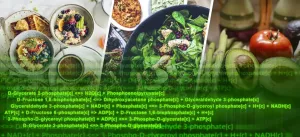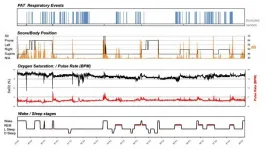INFORMATION:
Rock glaciers will slow Himalayan ice melt
2021-04-20
(Press-News.org) Some Himalayan glaciers are more resilient to global warming than previously predicted, new research suggests.
Rock glaciers are similar to "true" ice glaciers in that they are mixtures of ice and rock that move downhill by gravity - but the enhanced insulation provided by surface rock debris means rock glaciers will melt more slowly as temperatures rise.
Rock glaciers have generally been overlooked in studies about the future of Himalayan ice.
The new study, led by Dr Darren Jones at the University of Exeter, shows rock glaciers already account for about one twenty-fifth of Himalayan glacial ice - and this proportion will rise as exposed glaciers continue to melt and some transition to become rock glaciers.
"Glaciers play a vital role in regulating water supplies, and Himalayan glaciers regulate water for hundreds of millions of people," said Professor Stephan Harrison, of the University of Exeter.
"Over the past century, these glaciers have lost about 25% of their mass due to climate change, and they are predicted to lose more in the future.
"However, glacier models have treated glaciers as uniform lumps of ice - and our study shows not all glaciers will melt at the same rate.
"Many are covered in rock and are in various stages of the transition to rock glaciers.
"These slow-moving glaciers are well insulated, and as a result they are more resilient to global warming than 'true' glaciers."
The study has provided the first estimate of the number and importance of rock glaciers in the Himalayas.
It shows that there are about 25,000 rock glaciers in the region, containing a total of about 51 cubic kilometres of ice - or 41-62 trillion litres of water.
Despite this, lead author Dr Darren Jones cautioned: "Although we find that rock glaciers are more resilient to warming, it remains clear that all Himalayan glaciers are in long-term decline, with enormous implications for the people who rely on them for water supplies."
"Further research into Himalayan rock glaciers is critical for underpinning climate change adaptation strategies and to ensure that this highly populated region is in a strong position to meet sustainable development goals," said Professor Richard Betts, of the Met Office Hadley Centre and the University of Exeter, who was also involved in the study.
The research team included Dr Karen Anderson at the University of Exeter and Dr Sarah Shannon at the University of Bristol.
Funders included the Natural Environment Research Council, GW4 PhD funding to Dr Darren Jones, and the BEIS/Defra Met Office Hadley Centre Climate Programme.
The paper, published in the journal Science of the Total Environment, is entitled: "Rock glaciers represent hidden water stores in the Himalaya."
ELSE PRESS RELEASES FROM THIS DATE:
Designing healthy diets - with computer analysis
2021-04-20
A new mathematical model for the interaction of bacteria in the gut could help design new probiotics and specially tailored diets to prevent diseases. The research, from Chalmers University of Technology in Sweden, was recently published in the journal PNAS.
"Intestinal bacteria have an important role to play in health and the development of diseases, and our new mathematical model could be extremely helpful in these areas," says Jens Nielsen, Professor of Systems Biology at Chalmers, who led the research.
The new paper describes how the mathematical model performed when making predictions ...
Better marketing for a better world
2021-04-20
Newly published research contained in the Special Issue of the Journal of Marketing features fourteen global author teams focused on the topic of Better Marketing for a Better World. Edited by Rajesh Chandy (London Business School), Gita Johar (Columbia University), Christine Moorman (Duke University), and John Roberts (University of New South Wales), this Special Issue brings together wide-ranging research to assess, illuminate, and debate whether, when, and how marketing contributes to a better world.
The Special Issue is built on the thesis that marketing has the power to improve lives, sustain livelihoods, strengthen societies, and benefit the world at large. It calls for a renewed ...
Efforts to reduce opioid prescriptions may be hindering end-of-life pain management
2021-04-20
PORTLAND, Ore. - Policies designed to prevent the misuse of opioids may have the unintended side effect of limiting access to the pain-relieving drugs by terminally ill patients nearing the end of their life, new research led by the Oregon State University College of Pharmacy suggests.
A study of more than 2,500 hospital patients discharged to hospice care over a nine-year period showed a decreasing trend of opioid prescriptions as well as an increase in the prescribing of less powerful, non-opioid analgesics, meaning some of those patients might have been undertreated for their pain compared to similar patients in prior years.
The findings, published in the Journal of Pain and Symptom Management, are an important step toward optimizing ...
Individualized training is key for autistic adolescents learning to drive
2021-04-20
Philadelphia, April 20, 2021 - A collaborative study from the Center for Injury Research and Prevention (CIRP) and the Center for Autism Research (CAR) at Children's Hospital of Philadelphia (CHOP) identified clear strengths and a series of specific challenges autistic adolescents experience while learning to drive. The findings were recently published by the American Journal of Occupational Therapy.
Researchers conducted in-depth interviews with 17 specialized driving instructors who were trained as occupational therapists, driving rehabilitation specialists, or licensed driving instructors and who had completed additional training related ...
Flushing a public toilet? Don't linger, because aerosolized droplets do
2021-04-20
Flushing a toilet can generate large quantities of microbe-containing aerosols depending on the design, water pressure or flushing power of the toilet. A variety of pathogens are usually found in stagnant water as well as in urine, feces and vomit. When dispersed widely through aerosolization, these pathogens can cause Ebola, norovirus that results in violent food poisoning, as well as COVID-19 caused by SARS-CoV-2.
Respiratory droplets are the most prominent source of transmission for COVID-19, however, alternative routes may exist given the discovery of small numbers of viable viruses in urine and stool samples. Public restrooms are especially cause for concern for transmitting COVID-19 because they are ...
Proportion of Black physicians in US has changed little in 120 years
2021-04-20
A new UCLA study finds that the proportion of physicians who are Black in the U.S. has increased by only 4 percentage points over the past 120 years, and that the share of doctors who are Black men remains unchanged since 1940.
The research also spotlights a significant income gap between white and Black male physicians -- a disparity, the researcher writes, that could reflect a combination of pay discrimination and unequal access for physicians to pursue careers in more lucrative specialties. The paper will be published April 19 in the peer-reviewed Journal of General Internal Medicine.
"These findings demonstrate how slow progress has been, and how far and fast we have to go, if we care about the diversity of the physician workforce and the health benefits such diversity brings ...
Omega-3 supplements do double duty in protecting against stress
2021-04-20
COLUMBUS, Ohio - A high daily dose of an omega-3 supplement may help slow the effects of aging by suppressing damage and boosting protection at the cellular level during and after a stressful event, new research suggests.
Researchers at The Ohio State University found that daily supplements that contained 2.5 grams of omega-3 polyunsaturated fatty acids, the highest dose tested, were the best at helping the body resist the damaging effects of stress.
Compared to the placebo group, participants taking omega-3 supplements produced less of the stress hormone cortisol and lower levels of a pro-inflammatory protein during a stressful event in the lab. And while levels of protective compounds sharply declined in the placebo group after the stressor, there were ...
Researchers find a way to mend a broken heart
2021-04-20
A Monash University study has uncovered for the first time a way to prevent and reverse damage caused by broken-heart syndrome, also known as Takotsubo cardiomyopathy.
Using mouse models, the pre-clinical study published in the acclaimed journal Signal Transduction and Targeted Therapy, has shown the cardioprotective benefit of a drug called Suberanilohydroxamic acid, or SAHA, dramatically improved cardiac health and reversed the broken-heart. The landmark study used SAHA to target genes and is a world first for Takotsubo cardiomyopathy.
SAHA, currently used for cancer treatment, is approved by the US Food and Drug Administration (FDA) and Australian Therapeutic Goods Administration (TGA), works by providing a protective benefit to genes and ...
Disrupted sleep is linked to increased risk of death, particularly in women
2021-04-20
For the first time, a study has shown a clear link between the frequency and duration of unconscious wakefulness during night-time sleep and an increased risk of dying from diseases of the heart and blood vessels, and death from any cause, particularly in women.
The study of 8001 men and women, which is published today (Tuesday) in the European Heart Journal [1], found that women who experienced unconscious wakefulness most often and for longer periods of time had nearly double the risk of dying from cardiovascular disease during an average of between 6 and 11 years' ...
Multivits, omega-3, probiotics, vitamin D may lessen risk of positive COVID-19 test
2021-04-20
Taking multivitamins, omega-3, probiotics or vitamin D supplements may lessen the risk of testing positive for SARS-CoV-2, the virus responsible for COVID-19 infection--at least among women--indicates a large population study, published online in the journal BMJ Nutrition Prevention & Health.
But taking any of vitamin C, zinc, or garlic supplements wasn't associated with a lower risk of testing positive for the virus, the findings show.
There has been plenty of celebrity endorsement of the use of dietary supplements to both ward off and treat COVID-19 infection since the start of the pandemic, note the researchers.
In the UK alone, market share ...


